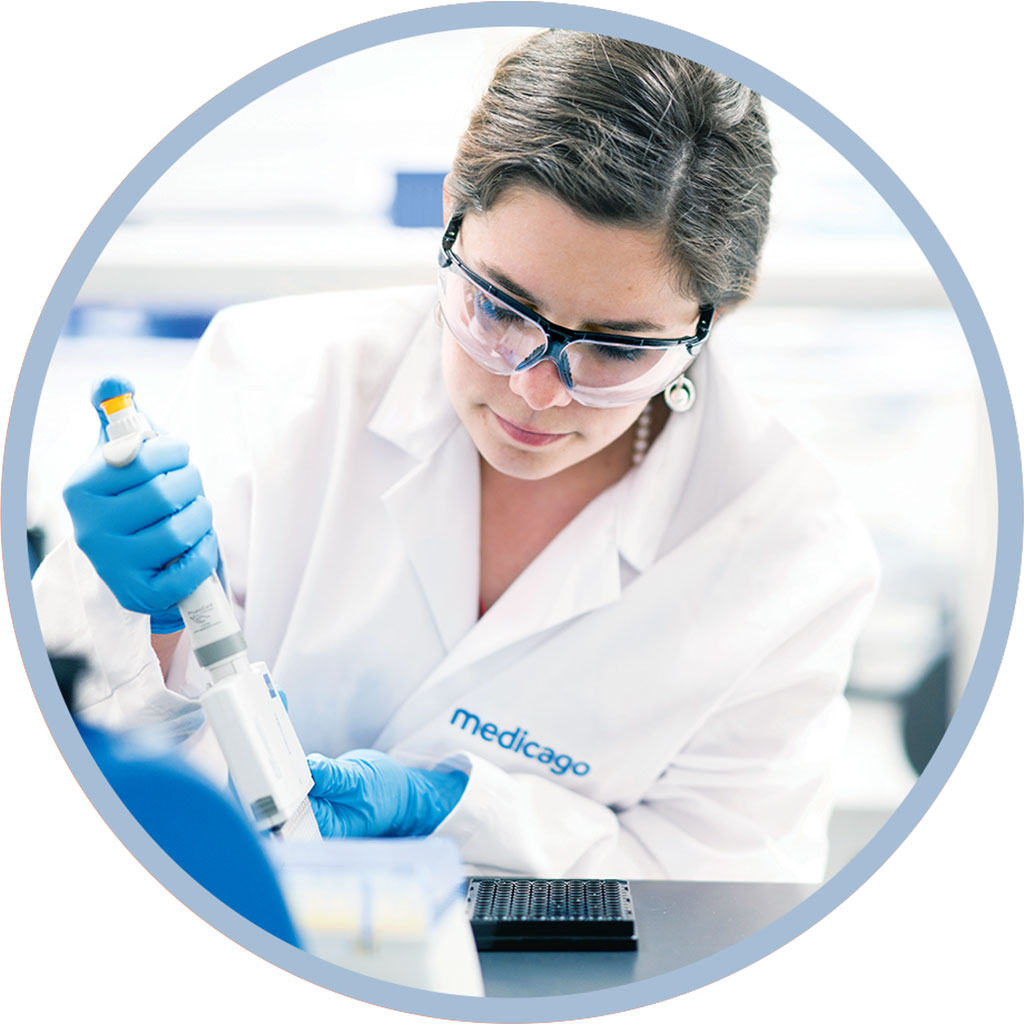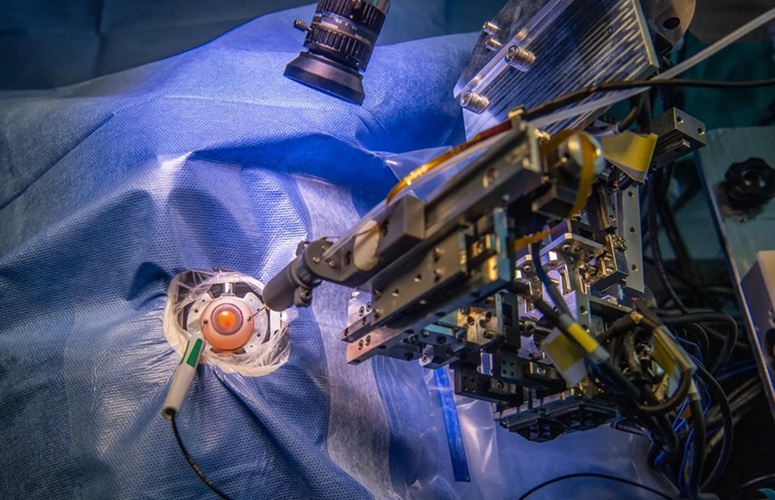GSK Collaborates with Medicago to Develop Novel Adjuvanted COVID-19 Candidate Vaccine
|
By HospiMedica International staff writers Posted on 08 Jul 2020 |

Image: GSK Collaborates with Medicago to Develop Novel Adjuvanted COVID-19 Candidate Vaccine (Photo courtesy of Medicago)
GlaxoSmithKline plc. (Brentford, UK) has entered into a collaboration with Medicago (Quebec City, Canada) to develop and evaluate an adjuvanted COVID-19 candidate vaccine.
The COVID-19 candidate vaccine will combine Medicago’s recombinant Coronavirus Virus-Like Particles (CoVLP) with GSK’s pandemic adjuvant system. CoVLPs mimic the structure of the virus responsible for COVID-19 disease, allowing them to be recognized by the immune system. The use of an adjuvant can be of particular importance in a pandemic situation as it may boost the immune response and reduce the amount of antigen required per dose, allowing more vaccine doses to be produced and therefore, contributing to protect more people.
Pre-clinical results with Medicago’s CoVLP vaccine candidate demonstrated a high level of neutralizing antibodies following a single dose when administered with adjuvant. Phase 1 clinical testing is planned to start in mid-July and will evaluate the safety and immunogenicity of three different dose levels of antigen combined with GSKs pandemic adjuvant and in parallel with an adjuvant from another company, administered on a one- and two-dose vaccination schedule, given 21 days apart. Subject to successful clinical development and regulatory considerations, the companies aim to complete development and make the vaccine available, in the first half of 2021. Both companies will also evaluate expanding their collaboration to develop a post-pandemic vaccine COVID-19 candidate, should the need arise based on the further development of COVID-19 after the pandemic, and other infectious diseases.
The companies will use Medicago’s plant-based production platform to manufacture the COVID-19 vaccine antigen. This innovative technology uses the leaves of a plant as bioreactors to produce the S-spike protein which self-assemble into VLPs for use in the CoVLP vaccine candidate. It is highly scalable and can support the production of large amounts of vaccine in a significantly shortened timeline. Using this technology, combined with GSKs proprietary adjuvant system, the companies expect to be able to manufacture approximately 100 million doses by the end of 2021. By the end of 2023, a large-scale facility under construction in Quebec City, Canada, is expected to deliver up to one billion doses annually. The manufacturing platform has been used to produce a seasonal VLP flu vaccine and the license application is under review with the Canadian regulatory authority.
“This agreement paves the way for an innovative vaccine option combining a scalable plant-based antigen technology with an adjuvant which has pandemic dose sparing capability,” said Dr. Thomas Breuer, Chief Medical Officer, GSK Vaccines. “If successful, it will be a meaningful contributor in the fight against COVID-19. We strongly believe that multiple vaccines are needed, including post-pandemic vaccines. This plant-based technology also shows promise beyond COVID-19 and has the potential to help prevent other infectious diseases.”
“We are about to begin clinical trials with our CoVLP vaccine candidate harnessing GSKs pandemic adjuvant technology against the virus that causes COVID-19,” said Dr. Bruce Clark, President and CEO of Medicago. “This collaboration with GSK gives us access to a proven adjuvant which could enhance the effectiveness of our candidate vaccine, and also to a depth of scientific experience to support our development efforts.”
Related Links:
GlaxoSmithKline plc.
Medicago
The COVID-19 candidate vaccine will combine Medicago’s recombinant Coronavirus Virus-Like Particles (CoVLP) with GSK’s pandemic adjuvant system. CoVLPs mimic the structure of the virus responsible for COVID-19 disease, allowing them to be recognized by the immune system. The use of an adjuvant can be of particular importance in a pandemic situation as it may boost the immune response and reduce the amount of antigen required per dose, allowing more vaccine doses to be produced and therefore, contributing to protect more people.
Pre-clinical results with Medicago’s CoVLP vaccine candidate demonstrated a high level of neutralizing antibodies following a single dose when administered with adjuvant. Phase 1 clinical testing is planned to start in mid-July and will evaluate the safety and immunogenicity of three different dose levels of antigen combined with GSKs pandemic adjuvant and in parallel with an adjuvant from another company, administered on a one- and two-dose vaccination schedule, given 21 days apart. Subject to successful clinical development and regulatory considerations, the companies aim to complete development and make the vaccine available, in the first half of 2021. Both companies will also evaluate expanding their collaboration to develop a post-pandemic vaccine COVID-19 candidate, should the need arise based on the further development of COVID-19 after the pandemic, and other infectious diseases.
The companies will use Medicago’s plant-based production platform to manufacture the COVID-19 vaccine antigen. This innovative technology uses the leaves of a plant as bioreactors to produce the S-spike protein which self-assemble into VLPs for use in the CoVLP vaccine candidate. It is highly scalable and can support the production of large amounts of vaccine in a significantly shortened timeline. Using this technology, combined with GSKs proprietary adjuvant system, the companies expect to be able to manufacture approximately 100 million doses by the end of 2021. By the end of 2023, a large-scale facility under construction in Quebec City, Canada, is expected to deliver up to one billion doses annually. The manufacturing platform has been used to produce a seasonal VLP flu vaccine and the license application is under review with the Canadian regulatory authority.
“This agreement paves the way for an innovative vaccine option combining a scalable plant-based antigen technology with an adjuvant which has pandemic dose sparing capability,” said Dr. Thomas Breuer, Chief Medical Officer, GSK Vaccines. “If successful, it will be a meaningful contributor in the fight against COVID-19. We strongly believe that multiple vaccines are needed, including post-pandemic vaccines. This plant-based technology also shows promise beyond COVID-19 and has the potential to help prevent other infectious diseases.”
“We are about to begin clinical trials with our CoVLP vaccine candidate harnessing GSKs pandemic adjuvant technology against the virus that causes COVID-19,” said Dr. Bruce Clark, President and CEO of Medicago. “This collaboration with GSK gives us access to a proven adjuvant which could enhance the effectiveness of our candidate vaccine, and also to a depth of scientific experience to support our development efforts.”
Related Links:
GlaxoSmithKline plc.
Medicago
Latest COVID-19 News
- Low-Cost System Detects SARS-CoV-2 Virus in Hospital Air Using High-Tech Bubbles
- World's First Inhalable COVID-19 Vaccine Approved in China
- COVID-19 Vaccine Patch Fights SARS-CoV-2 Variants Better than Needles
- Blood Viscosity Testing Can Predict Risk of Death in Hospitalized COVID-19 Patients
- ‘Covid Computer’ Uses AI to Detect COVID-19 from Chest CT Scans
- MRI Lung-Imaging Technique Shows Cause of Long-COVID Symptoms
- Chest CT Scans of COVID-19 Patients Could Help Distinguish Between SARS-CoV-2 Variants
- Specialized MRI Detects Lung Abnormalities in Non-Hospitalized Long COVID Patients
- AI Algorithm Identifies Hospitalized Patients at Highest Risk of Dying From COVID-19
- Sweat Sensor Detects Key Biomarkers That Provide Early Warning of COVID-19 and Flu
- Study Assesses Impact of COVID-19 on Ventilation/Perfusion Scintigraphy
- CT Imaging Study Finds Vaccination Reduces Risk of COVID-19 Associated Pulmonary Embolism
- Third Day in Hospital a ‘Tipping Point’ in Severity of COVID-19 Pneumonia
- Longer Interval Between COVID-19 Vaccines Generates Up to Nine Times as Many Antibodies
- AI Model for Monitoring COVID-19 Predicts Mortality Within First 30 Days of Admission
- AI Predicts COVID Prognosis at Near-Expert Level Based Off CT Scans
Channels
Critical Care
view channel
Light-Based Technology to Measure Brain Blood Flow Could Diagnose Stroke and TBI
Monitoring blood flow in the brain is crucial for diagnosing and treating neurological conditions such as stroke, traumatic brain injury (TBI), and vascular dementia. However, current imaging methods like... Read more
AI Heart Attack Risk Assessment Tool Outperforms Existing Methods
For decades, doctors have relied on standardized scoring systems to assess patients with the most common type of heart attack—non-ST-elevation acute coronary syndrome (NSTE-ACS). The GRACE score, used... Read moreSurgical Techniques
view channel
Robotic Assistant Delivers Ultra-Precision Injections with Rapid Setup Times
Age-related macular degeneration (AMD) is a leading cause of blindness worldwide, affecting nearly 200 million people, a figure expected to rise to 280 million by 2040. Current treatment involves doctors... Read more
Minimally Invasive Endoscopic Surgery Improves Severe Stroke Outcomes
Intracerebral hemorrhage, a type of stroke caused by bleeding deep within the brain, remains one of the most challenging neurological emergencies to treat. Accounting for about 15% of all strokes, it carries... Read morePatient Care
view channel
Revolutionary Automatic IV-Line Flushing Device to Enhance Infusion Care
More than 80% of in-hospital patients receive intravenous (IV) therapy. Every dose of IV medicine delivered in a small volume (<250 mL) infusion bag should be followed by subsequent flushing to ensure... Read more
VR Training Tool Combats Contamination of Portable Medical Equipment
Healthcare-associated infections (HAIs) impact one in every 31 patients, cause nearly 100,000 deaths each year, and cost USD 28.4 billion in direct medical expenses. Notably, up to 75% of these infections... Read more
Portable Biosensor Platform to Reduce Hospital-Acquired Infections
Approximately 4 million patients in the European Union acquire healthcare-associated infections (HAIs) or nosocomial infections each year, with around 37,000 deaths directly resulting from these infections,... Read moreFirst-Of-Its-Kind Portable Germicidal Light Technology Disinfects High-Touch Clinical Surfaces in Seconds
Reducing healthcare-acquired infections (HAIs) remains a pressing issue within global healthcare systems. In the United States alone, 1.7 million patients contract HAIs annually, leading to approximately... Read moreHealth IT
view channel
Printable Molecule-Selective Nanoparticles Enable Mass Production of Wearable Biosensors
The future of medicine is likely to focus on the personalization of healthcare—understanding exactly what an individual requires and delivering the appropriate combination of nutrients, metabolites, and... Read moreBusiness
view channel
Philips and Masimo Partner to Advance Patient Monitoring Measurement Technologies
Royal Philips (Amsterdam, Netherlands) and Masimo (Irvine, California, USA) have renewed their multi-year strategic collaboration, combining Philips’ expertise in patient monitoring with Masimo’s noninvasive... Read more
B. Braun Acquires Digital Microsurgery Company True Digital Surgery
The high-end microsurgery market in neurosurgery, spine, and ENT is undergoing a significant transformation. Traditional analog microscopes are giving way to digital exoscopes, which provide improved visualization,... Read more
CMEF 2025 to Promote Holistic and High-Quality Development of Medical and Health Industry
The 92nd China International Medical Equipment Fair (CMEF 2025) Autumn Exhibition is scheduled to be held from September 26 to 29 at the China Import and Export Fair Complex (Canton Fair Complex) in Guangzhou.... Read more

















